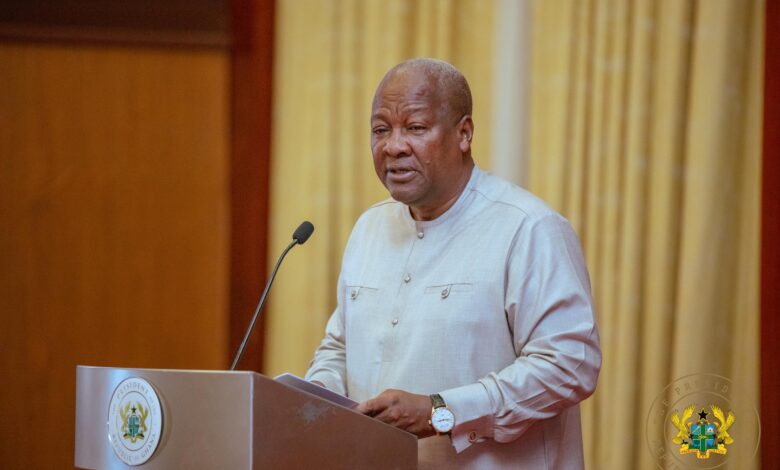
Accra, Ghana – President John Dramani Mahama has unveiled a new Code of Conduct aimed at promoting ethical leadership, accountability, and integrity among all political appointees under his administration.
The comprehensive code, launched on Monday, May 5, 2025, at the Jubilee House, forms a key part of President Mahama’s 120-day social contract with the people of Ghana and underscores his commitment to restoring discipline and public trust in governance.
The Code of Conduct applies to a wide range of government officials, including ministers, deputy ministers, presidential staffers, chief executive officers, board members, members of the Council of State, and other executive appointees.
Notably, the guidelines also bind both the President and the Vice-President, setting a new standard for leadership by example.
Among its major provisions is a strict ban on the acceptance of gifts and the acquisition of state assets by appointees, practices that have historically raised concerns about corruption and conflict of interest in public office.
Speaking at the launch, President Mahama emphasized that the move is not merely symbolic but a serious step toward building a more transparent and accountable administration.
“As part of our 120-day social contract, today we are taking a bold step to bring back discipline, integrity, and accountability into the heart of governance,” he stated.
President Mahama reiterated his belief that public service is a sacred trust and that every appointee must uphold the highest standards of ethical behaviour in their conduct and decisions.
The launch event was attended by members of the Executive, senior civil servants, governance experts, and civil society representatives.
Read the full speech by President Mahama below:
Many of you have not seen the Code of Conduct yet. Don’t have a heart attack when you receive your copy. Ministers of State, Deputy Ministers, Members of the Council of State, Presidential Staffers, Head of Agencies, Distinguished Guests, Ladies and Gentlemen.
In my 120-day social contract with the people of Ghana, I pledged to restore discipline, integrity and accountability into our governance.
Today we’re taking an important step towards fulfilling that promise with the official launch of the Code of Conduct for Political Appointees. This code represents a bold declaration of the standards we must uphold as servants of the public.
It reflects our commitment to build a government that is ethical, responsive and worthy of the people’s trust. Let me be clear. This document is not a ceremonial one.
It is a living and enforceable framework that outlines what is expected of every individual appointed under this administration.
Though the document often uses the term minister, it applies broadly to Deputy Ministers as well, to Presidential Staffers, to Chief Executive Officers and their Deputies, to Members of the Council of State, to Board Members and other Political Appointees within the Executive Arm of Government. And I include myself.
It applies to my Vice President, myself, the President, the Chief of Staff, the Executive Secretary, all advisors, all of us are bound by this Code of Conduct. This is a government (of shared responsibility and there will be no sacred cows.
Why do we need a Code of Conduct? Because we must build a new political culture, one that is rooted in transparency, humility and ethical leadership.
Ghanaians deserve leaders who serve with honour and put the public interest ahead of their personal gain. This Code is designed to guide our actions and decision making and to make clear the consequences that will happen when we fall short. Now let me highlight a few key principles and provisions of the Code.
All political appointees must serve the public with integrity and impartiality, must place the national interest above their personal interest, must avoid misuse of office or state resources, must declare and manage any potential conflict of interest, must eschew opulence, be accountable for every city or public money you spend and be humble in service, measured in language and respectful to citizens at all times. You are not in office to wield power, you are here to serve the people of Ghana.
The second is conflict of interest. Any situation that creates a conflict between your personal interest and your official duties must be avoided or disclosed. This includes holding stakes in companies that deal with government or with your ministries, using insider knowledge for your personal benefit, awarding contracts to entities that are connected to yourself or your close family.
If you are a dormant partner in any business engaging with the government, even outside your ministry, you must disclose it in writing to this office.
Not through a telephone call, not through a relative, you must submit an official declaration. Failure to do so will result in disloyal action.
Number three, interest of friends and family. Public perception matters. You must avoid making decisions that benefit your relatives or your close friends. You must not recommend them for contracts or appointments. If your actions give even the appearance of bias, you compromise the integrity of your office.
Number four, gifts and hampers. We all know our cultural fondness for gifts, but we must now draw a clear line between appreciation and influence.
Appointees are prohibited from accepting gifts or favors, especially from companies or individuals with interest in governmental decisions.
If a gift is received during an official engagement and its estimated value exceeds 20,000 Ghana cedis, it must be declared. And upon leaving office, the gift must be surrendered unless expressly permitted to retain it by the president.
As for hampers and gift items, no government funds, including internally generated funds, are to be used to purchase or distribute hampers. The only exception is modest gifts to staff as a reward for excellence or retirement.
For government entities that must distribute hampers or gifts as part of their corporate commercial policy, express permission for the budgeted expenditure must be received from the Office of the Chief of Staff.
Ministerial travel, all official or unofficial travel outside Ghana must receive and await its prior approval from the Chief of Staff’s office. And after each official trip, a report must be submitted on the trip and any impressed retired within 14 days after your return. Where government is footing the bill, the trip must be necessary, it must be budgeted for, and aligned with national priorities.
Retroactive approvals will no longer be entertained. Prohibition on purchasing state assets. No political appointee under this administration is permitted to purchase state assets, whether land, vehicles, shares, or buildings, directly or indirectly.
If you attempt to do so and you are found out, your appointment will be terminated. We are here to protect the national interest, not to help ourselves to the national past. Sanctions for violation.
The court sets out consequences for breach, public apology, from public apology to reprimand, to suspension, to resignation, or ultimately termination. Let me assure you that these sanctions are not cosmetic, they will be enforced, and I will not hesitate to act firmly and decisively, no matter who is involved.
Kindly do not put me in a position where I have to make that drastic choice, because when it comes to protecting the integrity of this government, I will not compromise.
Citizen engagement and reporting. Accountability does not end at the walls of this room and in just one code of conduct. I invite the citizens of Ghana to play a role in monitoring compliance of this code.
A portal will be created for the public to report suspected breaches with guarantees of confidentiality and impartial investigation. Ladies and gentlemen, what we launch today is more than a code, it is a declaration of intent.
It is the foundation of a new ethos in public service, one that values ethics over expediency, duty over indulgence, country over self.
We are here to serve and will serve with honor. On the 18th of February 2025, I set a deadline of 31st of March 2025 for all appointees who are taking office or being nominated at the time to declare their assets. An update provided by the Auditor General to my office indicates that some of you failed to meet that deadline.
For all those who are appointed or nominated before 31st March 2025 and failed to meet the deadline, you are to forfeit three months of salary to be donated to the Ghana Medical Trust Fund, named after me, MahamaCares.
In addition to one month’s salary that I have asked all appointees to donate to the MahamaCares Trust Fund. So it means that those who omitted to declare assets by the date, you are paying four months’ salary to MahamaCares.
However, if by close of day Wednesday 7th May 2025, any of you still fails to declare your assets, count yourself automatically dismissed.
The assets declaration regime is an important mechanism to check corruption and abuse of office, and it must be respected by all. My brothers and sisters, this is a very strict code, I must admit.
But if we abide by this code, it will restore the faith of our people in our democracy. Strict compliance with this code will restore confidence in the political elite and help to consolidate our democracy. And so I expect all of you to do your best to abide by the code.
Let us walk this path together with discipline, with humility, and with an unyielding commitment to the people of Ghana. Go ye forth and comply. I thank you, and may God bless us all.
Thank you very much.
Story by: Emmanuel Romeo Tetteh(#RomeoWrites





